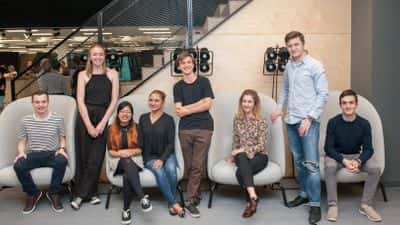Product
Engineer
Currently building for 50 million monthly learners worldwide at Quizlet. A product and mission driven software engineer based in London. Previously worked with Index Ventures building HackCampus to pair the best student talent with the best London startups.
You can read more about what I've worked on below, or find me online at the standard places, including ben@benchin.co.uk.
Work

Quizlet
At Quizlet, we help people to master whatever it is they are learning with our platform of user generated content and study tools. When I first moved to San Francisco in April 2015 to join them, the team was only 15 people strong but already serving 15 million monthly active users and in the top 50 most visited websites in the US. I had the unique honour of being the sole British engineer on the team!
Since then, we’ve grown to 50 million monthly active users, expanded the product offering greatly and grown the team to around 100 really talented people. In that time, as an engineer on the web platform, I’ve had the chance to work across the stack on a host of interesting problems.
That has included introducing Redux as a state management system on our front end as part of a site-wide redesign to improve engagement, rewriting our study mode grading system from a series of if/else statements into a rule-based, extensible grading engine and leading the charge on incrementally introducing Flow to our JS codebase. I also helped build out our most-used study mode on Quizlet, a personalised study assistant, powered by billions of study habit data points, that can identify a student’s weaknesses and help them learn and retain information as efficiently as possible.
In between, I’ve worked across the stack, adding to/modifying the API and ORM, building ETLs with Airflow, prototyping and introducing new tech such as GraphQL, Flow/TypeScript, and React Router.
I've also had the chance to work in the product discovery process for many of the product offerings at Quizlet. (In the early days, because it was almost a necessity, and today because the discovery process is incredibly inclusive and democratic.) Recently this has included contributing to the validation and prototyping of our premium content feature - an area of Quizlet where students can sell and buy high quality study material from verified content creators.

HackCampus
A little disillusioned at the career paths advertised at our universities, Ammaar, Harry and I sought to build HackCampus, a student tech society for the UK that would solve the startup talent dilemma. We aimed to build on the growing student hackathon community that we were part of and direct the innovation and creativity we found there to the right place. To us, that meant the UK startup ecosystem, not the banks and consultancies that had taken over our career fairs.
We caught the attention of Saul Klein, then at Index Ventures, and worked together with the team there to figure out how we could begin to ensure the best student hackers were able to work in an environment where they could have the biggest impact, and fuel the disruption happening in London’s tech scene.
Our most visible offering became the HackCampus internship programme - live for free in London and intern with its most exciting tech startups. The programme is now in it’s fourth year and has alumni from Deliveroo, Secret Escapes and SwiftKey.

Sandpit Labs
At Sandpit Lab, we worked with global brands like American Express, Unilever and Pepsico to create digital marketing products on an accelerated timeline. The core premise was to build products fast enough to make use of emerging tech for some of the best marketers in the world.
I was responsible for helping direct product strategy from a UX perspective as well as building out the prototypes we would iterate on with our clients.
This involved wireframing, designing mockups and UX flows, as well as building out the frontend of our applications, using Django, AngularJS and D3.
